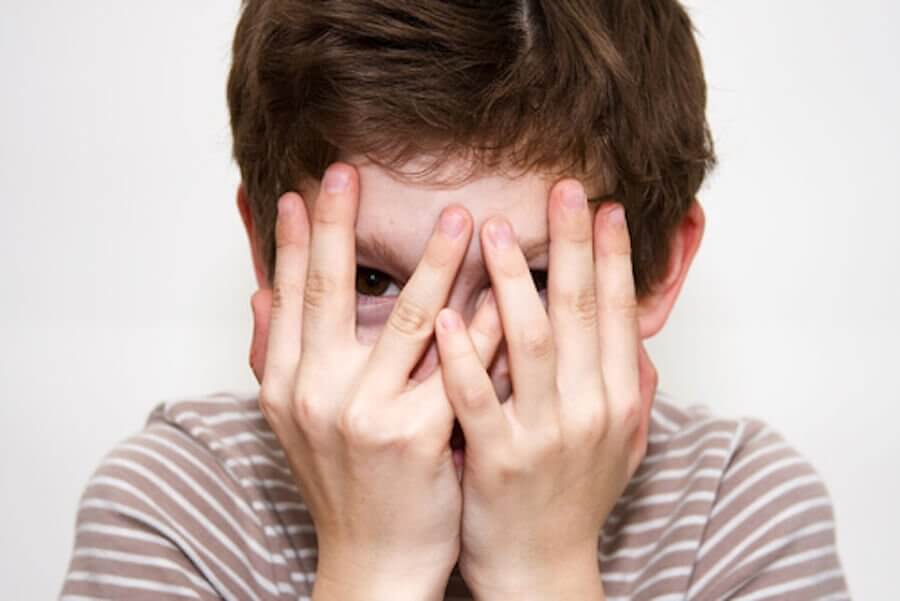How to Overcome Shyness During Childhood

While the origin of shyness can be genetic, children’s parents and environment are highly influential. Therefore, with appropriate steps, children can overcome shyness to a certain extent as they grow up.
Although shyness is a rather common personality trait, for some children it can be a serious problem.
To help children overcome shyness, it’s necessary for parents to understand what happens to children in each stage of childhood.
Signs of shyness in different stages of childhood
Many children are naturally shy from the time they’re born. A large part of their behavior in relation to shyness is due to their neurochemistry. That’s why they become cautious and show predisposition to new situations.
The first months
During their first months of life, some babies are more tolerant of company from different people, although those people don’t belong to their common environment. Generally, when someone smiles at them or is friendly, the baby feels comfortable.
In this period, the baby recognizes his parents. However, he isn’t able to identify their faces. Thus, taking care of their needs and demands of attention contributes to the fact that excessive shyness isn’t present in later stages.

Six months old
When a baby turns six months old, he tends to be very distrustful. Now he recognizes the faces of his parents and of those who’ve spent a lot of time with him. For that reason, a new face is foreign to him or generates insecurity.
In this stage of childhood, it’s very common for the child to feel support and security. He looks for familiar things in the people that he sees all the time. When those people aren’t present, it produces a fear of separation.
Many parents usually force the separation because they fear that their baby will gain absolute dependence. However, that is something the baby should learn on his own. As the baby grows, he starts to feel secure, while manifesting shyness in one or other forms.
Two years old
Children aren’t used to greeting strangers when they’re two years old. They hide behind their parents, and they need their parents to make them feel secure.
While this behavior is linked to shyness, in reality, children this age are socially selective. If they don’t deal with other children, it isn’t because they don’t want to, it’s that they prefer to play alone.
In general, children tend to get annoyed taking their toys away or behaving badly. Avoiding those situations promotes peace.
However, if shyness in different stages of childhood is excessive, it could be a problem. If the child is three years old and still doesn’t have any social interests, doesn’t play with other children, becomes insensitive to physical contact, and doesn’t express himself with clarity or shows anxiety before new situations, it may be necessary to get the help of an expert.
Three years old
From three to six years old, the child starts to develop certain intuitive habits, which is why he’s able to have a lot of interaction with others. However, this can also create certain fears, making him more sensitive to coming in contact with others.
He often becomes worried about what others think of him, and he can’t bear negative comments. He’s also scared he won’t live up to the expectations of his loved ones. He may become self-critical, focus on his weaknesses, and think that he lacks courage to face feared situations.
How can one overcome shyness during childhood?
First of all, it’s necessary to take into account how children manifest their emotions. Often, their behavior, the way they play, and drawings can reveal how children feel. This is useful because in the early stages, it’s hard for them to express those feelings with words.
- Often, small children can be intimidated in front of strangers. If they’re playing, they stop. To overcome that uncomfortable moment, parents need to calm them down. A smile, hug, or words of encouragement are a huge help for the child to be trustful.
- Even though the child doesn’t feel comfortable, it doesn’t make sense to distance him from others. It would help for him to integrate. This social exhibition is useful, as it will make him feel relaxed in front of people.
- When he’s a little older, in the stage where he’s listening to and reasoning with everybody else, it doesn’t make sense to tell him that he’s shy. This can appear to be criticism, and as a consequence, this can cause him to retract more.
- To make a child feel secure, it’s wiser to express that the child needs time to feel comfortable with strangers.
- It’s also important to have realistic expectations, since shyness in the different phases of childhood can be endured. However, if you expect too much from your child, it can have repercussions on his behavior.

Is it possible to overcome shyness in childhood?
Although it may be worrisome, there’s no way of knowing if a shy child will stop being shy. In many cases, children do overcome shyness throughout the different stages of childhood. As they grow, they tend to open up.
As a mother or a father, you can make an effort by offering stability, support, and affection. If you help your children feel comfortable, they’ll have more confidence to overcome shyness in childhood.
While the origin of shyness can be genetic, children’s parents and environment are highly influential. Therefore, with appropriate steps, children can overcome shyness to a certain extent as they grow up.
Although shyness is a rather common personality trait, for some children it can be a serious problem.
To help children overcome shyness, it’s necessary for parents to understand what happens to children in each stage of childhood.
Signs of shyness in different stages of childhood
Many children are naturally shy from the time they’re born. A large part of their behavior in relation to shyness is due to their neurochemistry. That’s why they become cautious and show predisposition to new situations.
The first months
During their first months of life, some babies are more tolerant of company from different people, although those people don’t belong to their common environment. Generally, when someone smiles at them or is friendly, the baby feels comfortable.
In this period, the baby recognizes his parents. However, he isn’t able to identify their faces. Thus, taking care of their needs and demands of attention contributes to the fact that excessive shyness isn’t present in later stages.

Six months old
When a baby turns six months old, he tends to be very distrustful. Now he recognizes the faces of his parents and of those who’ve spent a lot of time with him. For that reason, a new face is foreign to him or generates insecurity.
In this stage of childhood, it’s very common for the child to feel support and security. He looks for familiar things in the people that he sees all the time. When those people aren’t present, it produces a fear of separation.
Many parents usually force the separation because they fear that their baby will gain absolute dependence. However, that is something the baby should learn on his own. As the baby grows, he starts to feel secure, while manifesting shyness in one or other forms.
Two years old
Children aren’t used to greeting strangers when they’re two years old. They hide behind their parents, and they need their parents to make them feel secure.
While this behavior is linked to shyness, in reality, children this age are socially selective. If they don’t deal with other children, it isn’t because they don’t want to, it’s that they prefer to play alone.
In general, children tend to get annoyed taking their toys away or behaving badly. Avoiding those situations promotes peace.
However, if shyness in different stages of childhood is excessive, it could be a problem. If the child is three years old and still doesn’t have any social interests, doesn’t play with other children, becomes insensitive to physical contact, and doesn’t express himself with clarity or shows anxiety before new situations, it may be necessary to get the help of an expert.
Three years old
From three to six years old, the child starts to develop certain intuitive habits, which is why he’s able to have a lot of interaction with others. However, this can also create certain fears, making him more sensitive to coming in contact with others.
He often becomes worried about what others think of him, and he can’t bear negative comments. He’s also scared he won’t live up to the expectations of his loved ones. He may become self-critical, focus on his weaknesses, and think that he lacks courage to face feared situations.
How can one overcome shyness during childhood?
First of all, it’s necessary to take into account how children manifest their emotions. Often, their behavior, the way they play, and drawings can reveal how children feel. This is useful because in the early stages, it’s hard for them to express those feelings with words.
- Often, small children can be intimidated in front of strangers. If they’re playing, they stop. To overcome that uncomfortable moment, parents need to calm them down. A smile, hug, or words of encouragement are a huge help for the child to be trustful.
- Even though the child doesn’t feel comfortable, it doesn’t make sense to distance him from others. It would help for him to integrate. This social exhibition is useful, as it will make him feel relaxed in front of people.
- When he’s a little older, in the stage where he’s listening to and reasoning with everybody else, it doesn’t make sense to tell him that he’s shy. This can appear to be criticism, and as a consequence, this can cause him to retract more.
- To make a child feel secure, it’s wiser to express that the child needs time to feel comfortable with strangers.
- It’s also important to have realistic expectations, since shyness in the different phases of childhood can be endured. However, if you expect too much from your child, it can have repercussions on his behavior.

Is it possible to overcome shyness in childhood?
Although it may be worrisome, there’s no way of knowing if a shy child will stop being shy. In many cases, children do overcome shyness throughout the different stages of childhood. As they grow, they tend to open up.
As a mother or a father, you can make an effort by offering stability, support, and affection. If you help your children feel comfortable, they’ll have more confidence to overcome shyness in childhood.
All cited sources were thoroughly reviewed by our team to ensure their quality, reliability, currency, and validity. The bibliography of this article was considered reliable and of academic or scientific accuracy.
- Cano Vindel, A., Pellejero, M., Ferrer, M. A., Iruarrizgada, I., & Zauzo, A. (2001). Aspectos Cognitivos, Emocionales, Genéticos Y Diferenciales De La Timidez. Revista Electrónica de Motivación y Emoción
- Ito, L. M., Roso, M. C., Tiwari, S., Kendall, P. C., & Asbahr, F. R. (2008). Terapia cognitivo-comportamental da fobia social. Revista Brasileira de Psiquiatria. https://doi.org/10.1590/S1516-44462008000600007
- Olivares, J., Rosa, A. I., Piqueras, J. A., Sánchez-Meca, J., Méndez, X., & García-López, L. J. (2002). Timidez y fobia social en niños y adolescentes: Un campo emrgente. Psicologia Conductual. https://doi.org/10.1016/S0975-3575(11)80026-X
This text is provided for informational purposes only and does not replace consultation with a professional. If in doubt, consult your specialist.








